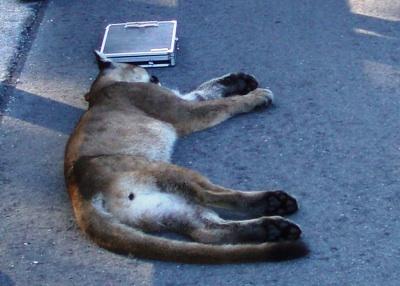Perched precariously on the lip of extinction, Florida panthers face staggering odds to exist beyond notations in history books. The loss of three panthers over three days this past weekend certainly won't improve those odds.
While there certainly has been good news surrounding the Florida panther, long-viewed as the most likely mammal in the United States to go extinct, the loss of three young animals is sobering against a population that, going into the weekend, wasn't much more than 100 individuals.
The three were killed in vehicle accidents: an 6- to 8-month old male's body was found Sunday along U.S. 41, aka the Tamiami Trail; a 5-year-old female's body was found Saturday, also along the highway, and; a 4-year-old male died Friday along U.S. 41 within the boundaries of Big Cypress National Preserve.
At the Florida Fish and Wildlife Commission, Darrell Land, who oversees the state's panther project, downplayed the losses.
"Losing three panthers in three days saddens all who care for these endangered animals. However, we're heartened when we have a good capture season like this past one, when we captured 11 new panthers," Mr. Land said Monday. "Panthers breed throughout the year, and our radio-collared females have already produced 12 kittens. The increase in panther numbers also means that more panthers are roaming the roadways in the Big Cypress area, and drivers should always obey the panther speed zones and slow down from dusk to dawn no matter where they might be driving."
Florida panthers, which have officially been categorized as "endangered" under the Endangered Species Act since 1973, require considerable acreage. Males, which can measure 8 feet tail tip to tip of the nose and weigh as much as 160 pounds, roam home ranges of 150-200 square miles, while females lay claim to about 80 square miles. Covering 20 miles a day is not unusual for the panthers as they hunt white-tail deer, wild hogs, and other small game. Though nocturnal and rarely seen, their screams can be unmistakable and frightful.
While in the 1980s there were thought to be only about two dozen of these cats in south Florida, today the number is at least 100, perhaps a dozen or two more. According to U.S. Fish and Wildlife Service officials, data collected during annual captures and radio-collaring operations, camera traps, and mortalities show the population "is very demographically healthy and diverse with kittens, juveniles, young adults, prime adults, and older adults."
Though Mr. Land noted that they know of at least a dozen kittens born this spring, he also said in a release from the commission that two litters of kittens have been lost because of the death of their mothers in the past two months. Exactly how many individual kittens were lost is hard to say because biologists have not found the litters. However, they're being written off because their mothers -- both 5-years-old -- were killed, and kittens cannot survive on their own until they're at least 8 months old.
The one female, "FP172," who was killed by another panther back in March, was known to have had a litter of three male kittens in late February in Big Cypress National Preserve. The other female, "FP158," was the 5-year-old female killed on Saturday. She had had a litter in late April, but biologists don't know how many kittens were in it.
To help protect the large cats from increasing traffic threats, the Florida Wildlife Commission, the Collier County and Lee County sheriff's deputies, and the Florida Highway Patrol regularly enforce panther speed zones. Panther speed zones are well-marked, with speed limits reduced at night to 45 mph.
So far this year, 66 citations and nine warnings have been issued to motorists violating panther speed zones, according to Florida officials. Motorists should be aware that violators often receive fines exceeding $200 for their first offense, and any violation of more than 29 mph over the posted limit will result in a mandatory court appearance.
Despite the latest loss of at least seven panthers, Mr. Land remains optimistic that the overall population is doing OK.
"The increasing number of panther road kills mirrors the increase in panther numbers," Mr. Land said. "However, this does not indicate that the increase of collisions is causing the population to decrease. The FWC continues to work closely with the Florida Department of Transportation to develop measures that will increase motorist and panther safety along Florida's roads."


 Support Essential Coverage of Essential Places
Support Essential Coverage of Essential Places







Comments
It's so disheartening to hear about the loss of these three panthers, especially the mother. As a frequent visitor over the years to panther country I've seen the speed signs and in my opinion there is no excuse for people to not see or obey those signs. You'd think people would respect the safety of these critically endangered cats and give them a brake so they can continue to survive for many years to come so people can have to chance to view one of the last representatives of the primeval wilds of the eastern US.
Slow down drivers now before you waste the beautiful creatures of the southern U.S. Please.
When I worked down there I often saw locals purposely running over the animals. I was once trying to get an alligator out of the road and a car went around me to hit it. It infuriates me to see things like this happens. How people can have such a disrespect for any living thing is beyond me. Thank goodness my mother taught me better!
Pls slow down drivers. There are not many true Florida panthers left. One had kittens and I hope they are found. There were 3 and this would help the population grow if found alive. There is no need for rushing in this area. You will get to ur destination, pls slow down and keep a watchful eye while driving! The cats thank you.